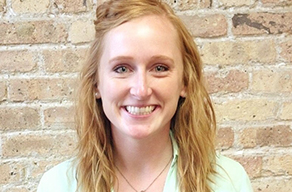Relationship Focused Sensory Treatment: We Shouldn't Just Treat Individuals

I’m Carrie Einck and you know me from the STAR Institute videos on Sensory Processing Disorder (SPD) for adults and teens. Today, I’m sharing my story of what drove me to work with families dealing with Sensory Processing challenges and how I address sensory challenges in my own life.... (BUT don't forget to read Sarah's story too!)
I first learned about sensory processing in my occupational therapy graduate school courses. I remember the moment I learned that there were more than the five senses I had learned in elementary school. It was this “aha” moment, both personally and academically. Learning about the additional three senses (proprioception, vestibular, and interoception) helped make sense of why some of my hobbies (running, yoga, etc) were so beneficial for me. It also helped me learn about the “just right” arousal in order to study for quality instead of quantity. As I have studied and worked in settings where I assess and treat sensory processing concerns, I continue to learned and refine what my own sensory profile is. In general, I have learned that I seek olfactory (smell), proprioceptive, and vestibular inputs. I can accomplish this daily through using essential oils and also through the movement I receive treating individuals in the sensory gym, as well as, incorporating my own movement into my daily routine. I have found that rebounding, stretching, yoga, and running tend to have the most benefits toward my arousal. Contrarily, I tend to be somewhat sensitive to visual and auditory input. I have learned that I am more sensitive on some days than others, but my best supports for this are using natural/lamp lighting in my home and work spaces, wearing sunglasses when I am outside, and limiting the amount of time I am in noisy spaces.
Learning what best supports me now has led me to ask questions about what I was like as a child. To no surprise, I was the child who loved spinning myself quickly on the backyard swing, climbing all over every piece of furniture from the moment I could crawl, and always asking people to be quiet when I was sitting with them at mealtime. For me, this helps validate that sensory processing is lifelong and that strategies do work. By staying attuned to my own sensory preferences and challenges, I can better emphasize and strategize with my clients. I find that when my equilibrium is thrown off by lack of sleep and/or sickness, all of these sensitivities become heightened. I begin to imagine that these feelings may be what some of my clients may be feeling on an everyday basis.
I think my desire to work within the Sensory Processing Disorder (SPD) population stems from that initial “aha” moment I had in graduate school. Sensory processing makes sense for me on a personal and professional level. I have seen sensory-based interventions change lives and bring joy for the first time to entire families. Getting the opportunity to help create a program at STAR Institute for adolescents and adults with SPD and their families has been life changing to me. It is a service that has rarely been available for them in the past. I have seen how powerful it can be even after 30-40 years of no intervention. I believe it has saved lives, marriages, and relationships between parents and their child/ren.
I was led to work at STAR Institute when I learned the model was focused on entire families and relationships, not just one individual. I have been able to listen and work with moms, dads, siblings, spouses, and significant others, as well as, the individual. I find this so very important. When I was just starting elementary school, I learned that my younger sister was diagnosed with a chromosomal condition called Turner Syndrome. I remember the time my family got this diagnosis. It was scary and shocking all of us. As an older (but not very old) sister, I felt confused. I remember instantly feeling that it would be my role to be brave and helpful in any way that I could. I remember asking my mom what I could do to help and neither of us having any tangible solutions. Later on, my mom would go on to tell me that the doctors told my parents to “treat her as any other child and she will be fine.” The thing is, that this condition does change things for her and for our whole family. She would go on to receive daily painful growth hormone injections that led to very frequent meltdowns, panic, and fear from everyone in the family. As time passed, she developed differently emotionally, socially, and physically. As a sister, I continued to take on my role of learning what I could, trying to give the advice I could, but more importantly trying to be the strong and (hopefully) helpful one.
Reflecting on that experience, I wish that a family like mine could have had a relationship-based professional validating and helping our family system. These services are few and far between, but even the littlest bit of validation and understanding from a professional can go a long way. I hope to help entire family structures have the validation and understanding that neither me nor my family had throughout my childhood. I hope that I can be someone who can let families know that getting help and understanding can be pivotal not just for the individual, but for the entire support system around them. I am grateful for all the practice I have had in helping, empowering, and learning about myself as well as the neuro-differences we all have that makes each of us unique. It has helped me really understand, grow, and sit with each of the families I work with here.
If you are looking for SPD treatment for yourself or your child fill out a child or adult intake form now to be treated at STAR Institute Treatment Center or search our Treatment Directory to find services in your area.
 Get the series now! Learn about five essential topics for adults and teens with Sensory Processing Disorder (SPD). This series is for individuals with SPD, parents, caregivers, and professionals working with the SPD population.
Get the series now! Learn about five essential topics for adults and teens with Sensory Processing Disorder (SPD). This series is for individuals with SPD, parents, caregivers, and professionals working with the SPD population.
Presented by adult SPD specialists, Carrie Einck, MS, OTR/L and Sarah Norris, MS, OTR/L who have spearheaded STAR Institue's renowned adult and adolescent treatment program.
Carrie graduated with her Master’s Degree in Occupational Therapy from the University of Wisconsin- La Crosse. She has extensive knowledge and training in Sensory Processing Disorder treatment and evaluation through participation in the Level 1 Mentorship program with the STAR Center and through participation in the SIPT Certification program. Carrie has also received training in iLs, Therapeutic Listening, SOS feeding approach and Handwriting Without Tears.
Before joining the STAR team, she worked in both the outpatient pediatric clinic setting and school settings in Chicago and volunteered abroad as an OT in order to further her understanding of occupational therapy from a global perspective. In Chicago, she also founded a community-based social skills group for kids of all ages and abilities that promote social skill building and motor development through a fun and motivating class taught on mini trampolines.

 Carrie Einck OTR/L
Carrie Einck OTR/L